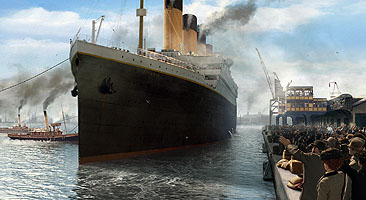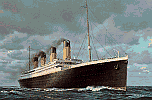|
At 2:20 AM on April 15, 1912, the Titanic, then the world's largest and most luxurious ocean liner, disappeared into the
icy depths of the North Atlantic. With her she took the lives of some 1,500 men, women, and children more casualties than
in any other marine disaster in peacetime history.
After striking a huge iceberg, the 46,500-ton vessel sank in less
than three hours. Lloyd's of London, the firm which had insured the Titanic, had reasoned that the probability of such an
event was one in a million. The ship's specially constructed bulkheads, it was believed, would check the seawater no matter
how severely the ship might be damaged. As though fully convinced of the Titanic's invulnerability, the White Star Line had
provided only enough lifeboats for half the persons aboard.
On the evening of April 14 the 883-foot-long ship had been
speeding through smooth seas at 22.5 knots. She was bound from Southampton, England, to New York City on her maiden voyage.
Nearby steamers had issued reports of dangerous ice floes. The Californian, less than 20 miles from the Titanic, had stopped
her engines until conditions were safer. But the "unsinkable" Titanic sped confidently on. The White Star Line was
eager for her to make good time on her first crossing of the Atlantic.
At 11:40 PM the lookout on the Titanic's bridge
saw an ominous shape ahead. "Ice! Dead ahead! A big berg!" he shouted. The helm was turned hard over; the engines
were reversed. But it was too late. A 300-foot gash was ripped along the side of the Titanic's hull as though it were made
of tin.
When the accident occurred, there was little excitement among the passengers. They were told only that there
might be a slight delay. The ship's orchestra continued to play popular tunes. But the Titanic's bow was settling deeper by
the minute. When the command was finally given to enter the lifeboats, many passengers still refused to believe that the ship
was in real danger.
Since there were not enough lifeboats, many of the men gallantly insisted that women and children
be allowed into them first. Husbands, separated from their wives and children, were forced to remain aboard as the ship sank
deeper into the icy waters. There were acts of cowardice also lifeboats pulled away half empty.
The British steamer
Carpathia picked up the Titanic's SOS and radioed back, "Coming hard." Several hours later she rescued 712 passengers
and crewmen from the Titanic's lifeboats.
Had the lookout not sighted the iceberg and the helmsman not turned the wheel,
the Titanic would probably have hit the iceberg head on. It is then likely that only the bow sections of the ship would have
been flooded and, though seriously crippled, she would have remained afloat and been able to reach her destination

|



